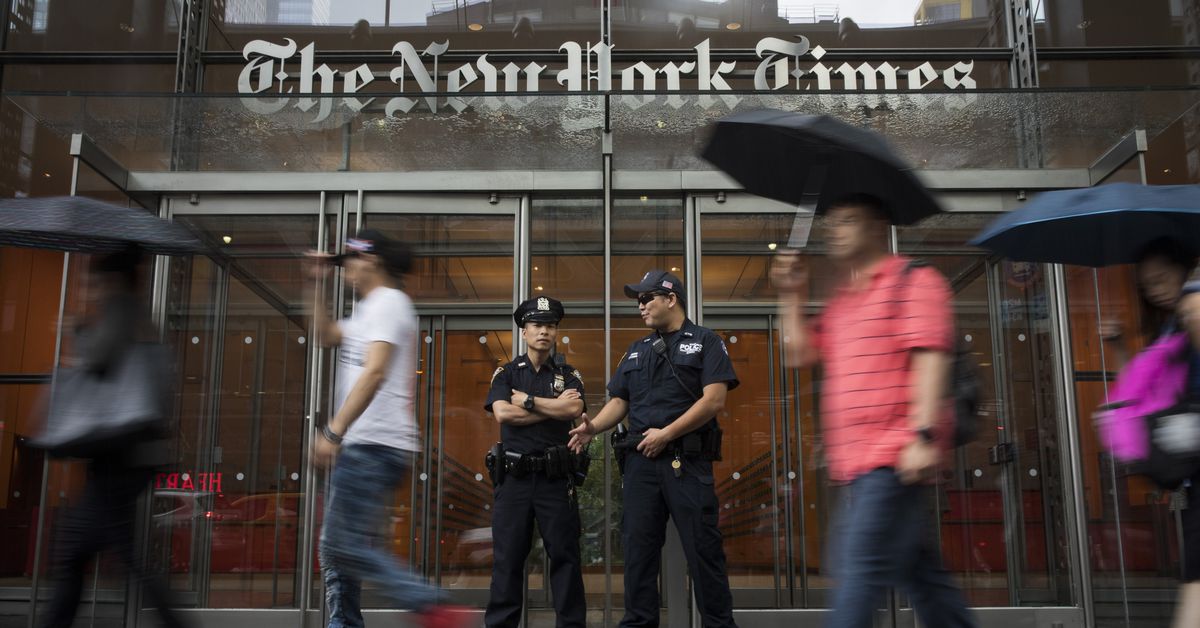A New York Times copyright lawsuit could kill OpenAI::A list of authors and entertainers are also suing the tech company for damages that could total in the billions.
I always say this when this comes up because I really believe it’s the right solution - any generative AI built with unlicensed and/or public works should then be free for the public to use.
If they want to charge for access that’s fine but they should have to go about securing legal rights first. If that’s impossible, they should worry about profits some other way like maybe add-ons such as internet connected AI and so forth.
A very compelling solution! Allows a model of free use while providing an avenue for business to spend time developing it
Nice idea but how do you propose they pay for the billions of dollars it costs to train and then run said model?
Then don’t do it. Simple as that.
This is why we can’t have nice things
Defending scamming as a business model is not a business model.
Not really how it works these days. Look at Uber and Lime/Bird scooters. They basically would just show up to a city and say the hell with the law we are starting our business here. We just call it disruptive technology
Running AI isn’t free, and AI calculations pollute like a motherfucker
This isn’t me saying you’re wrong on an ethical or judicial standpoint, because on those I agree. It’s just that, on a practical level considerations have to be made.
For me, those considerations alone (and a ton of other considerations such as digital slavery, child porn etc) make me just want to pull the plug already.
AI was fun. It’s a dumb idea for dumb buzzword spewing silicon valley ghouls. Pull the plug and be done with it.
The thing is that those models aren’t even open source, if it was then you could argue that openai’s business model is renting processing power. Except they’re not so their business model is effectively selling models trained on copyrighted data
Plus, they built the whole thing on the basis of “research purposes” when in reality from the very start they intended to use this as a business above all else. But tax benefits, copyright leniency etcetera were used liberally because ‘it’s just research’.
And then keeping it closed source. The whole thing is a typical silicon valley scam where they will use whatever they can get their grubby little hands on, and when the product is finally here, they make sure to throw it into the world with such a force that legislators can’t even respond adequately. That’s how they make sure that there will be no legislation on if the whole thing is even legal or ethical to begin with, but merely to keep it contained. From then on, they can just keep everything in courts indefinitely while the product festers like a cancer.
It’s the same thing with blockchains basically.
Also, again, digital slavery being used to ‘train’ models and child porn being used to train them because the web scrapers they used can’t and won’t discern whatever shit they rake up into the garbled pile of other people’s works.
What is unlicensed work? Copyrighted content will not have a licence agreement but this doesn’t mean you can freely infringe on copyright law.
Stuff lile public domain books, I guess, like alice in wonderland, and cc0 content
Would you, after devoting full years of your adult life to the unpaid work of learning the requisite advanced math and computer science needed to develop such a model, like to spend years more of your life to develop a generative AI model without compensation? Within the US, it is legal to use public text for commercial purposes without any need to obtain a permit. Developers of such models deserve to be paid, just like any other workers, and that doesn’t happen unless either we make AI a utility (or something similar) and funnel tax dollars into it or the company charges for the product so it can pay its employees.
I wholeheartedly agree that AI shouldn’t be trained on copyrighted, private, or any other works outside of the public domain. I think that OpenAI’s use of nonpublic material was illegal and unethical, and that they should be legally obligated to scrap their entire model and train another one from legal material. But developers deserve to be paid for their labor and time, and that requires the company that employs them to make money somehow.
Also anything produced with solar power should be free.
Yes, good point, resource collection is nearly identical to content generation
I doubt it. It would likely kill any non Giant tech backed AI companies though
Microsoft has armies of lawyers and cash to pay. It would make life a lot harder, but they’d survive
If OpenAI owns a Copyright on the output of their LLMs, then I side with the NYT.
If the output is public domain–that is you or I could use it commercially without OpenAI’s permission–then I side with OpenAI.
Sort of like how a spell checker works. The dictionary is Copyrighted, the spell check software is Copyrighted, but using it on your document doesn’t grant the spell check vendor any Copyright over it.
I think this strikes a reasonable balance between creators’ IP rights, AI companies’ interest in expansion, and the public interest in having these tools at our disposal. So, in my scheme, either creators get a royalty, or the LLM company doesn’t get to Copyright the outputs. I could even see different AI companies going down different paths and offering different kinds of service based on that distinction.
I want people to take my code if they share their changes (gpl). Taking and not giving back is just free labor.
If LLMs like ChatGPT are allowed to produce non-copyrighted work after being trained on copyrighted work, you can effectively use them to launder copyright, which would be equivalent to abolishing it at the limit.
A much more elegant and equitable solution would be to just abolish copyright outright. It’s the natural direction of a country that chooses to invest in LLMs anyways.
YES! AI is cool I guess, but the massive AI circlejerk is so irritating though.
If OpenAI can infringe upon all the copyrighted material on the net then the internet can use everything of theirs all for free too.
The NYT has a market cap of about $8B. MSFT has a market cap of about $3T. MSFT could take a controlling interest in the Times for the change it finds in the couch cushions. I’m betting a good chunk of the c-suites of the interested parties have higher personal net worths than the NYT has in market cap.
I have mixed feelings about how generative models are built and used. I have mixed feelings about IP laws. I think there needs to be a distinction between academic research and for-profit applications. I don’t know how to bring the laws into alignment on all of those things.
But I do know that the interested parties who are developing generative models for commercial use, in addition to making their models available for academics and non-commercial applications, could well afford to properly compensate companies for their training data.
The danger of the rich and evil simply buying out their critics is a genuine risk. After all, it’s what happened to Gawker when Peter Thiel decided he personally didn’t like them, neutering their entire network.
Regarding OpenAI the corporation, they pulled an incredibly successful bait and switch, pretending first to gather data for educational purposes, and then switching to being a for-profit as soon as it benefited them. In a better world or even a slightly more functional American democracy, their continued existence would be deemed inexcusable.
Or Musk when he decided he didn’t like what people were saying on Twitter.
I completely agree. I don’t want them to buy out the NYT, and I would rather move back to the laws that prevented over-consolidation of the media. I think that Sinclair and the consolidated talk radio networks represent a very real source of danger to democracy. I think we should legally restrict the number of markets a particular broadcast company can be in, and I also believe that we can and should come up with an argument that’s the equivalent of the Fairness Doctrine that doesn’t rest on something as physical and mundane as the public airwaves.
Oh no, how terrible. What ever will we do without Shenanigans Inc. 🙄
Oh no. Anyways.
The problem with copyright is that everything is automatically copyrighted. The copyright logo is purely symbolic, at this point. Both sides are technically right, even though the courts have ruled that anything an AI outputs is actually in the public domain.
Works involving the use of AI are copyrightable. Also, the Copyright Office’s guidance isn’t law. Their guidance reflects only the office’s interpretation based on its experience, it isn’t binding in the courts or other parties. Guidance from the office is not a substitute for legal advice, and it does not create any rights or obligations for anyone. They are the lowest rung on the ladder for deciding what law means.
I wasn’t talking about Copyright Office. I was talking about the courts.
This ruling is about something else entirely. He tried to argue that the AI itself was the author and that copyright should pass to him as he hired it.
An excerpt from your article:
In 2018, Dr. Thaler sought to register “Recent Entrance” with the U.S. Copyright Office, listing the Creativity Machine as its author. He claimed that ownership had been transferred to him under the work-for-hire doctrine, which allows the employer of the creator of a given work or the commissioner of the work to be considered its legal author. However, in 2019, the Copyright Office denied copyright registration for “Recent Entrance,” ruling that the work lacked the requisite human authorship. Dr. Thaler requested a review of his application, but the Copyright Office once more refused registration, restating the requirement that a human have created the work.
Copyright is afforded to humans, you can’t register an AI as an author, the same as a monkey can’t hold copyright.
Here’s the summary for the wikipedia article you mentioned in your comment:
Between 2011 and 2018, a series of disputes took place about the copyright status of selfies taken by Celebes crested macaques using equipment belonging to the British wildlife photographer David J. Slater. The disputes involved Wikimedia Commons and the blog Techdirt, which have hosted the images following their publication in newspapers in July 2011 over Slater’s objections that he holds the copyright, and People for the Ethical Treatment of Animals (PETA), who have argued that the copyright should be assigned to the macaque. Slater has argued that he has a valid copyright claim because as he engineered the situation that resulted in the pictures by travelling to Indonesia, befriending a group of wild macaques, and setting up his camera equipment in such a way that a selfie might come about. The Wikimedia Foundation’s 2014 refusal to remove the pictures from its Wikimedia Commons image library was based on the understanding that copyright is held by the creator, that a non-human creator (not being a legal person) cannot hold copyright, and that the images are thus in the public domain.
Don’t threaten me with a good time!
This is the best summary I could come up with:
Late last year, the New York Times sued OpenAI and Microsoft, alleging that the companies are stealing its copyrighted content to train their large language models and then profiting off of it.
Meanwhile, the Senate Judiciary Subcommittee on Privacy, Technology, and Law held a hearing in which news executives implored lawmakers to force AI companies to pay publishers for using their content.
In its rebuttal, OpenAI said that regurgitation is a “rare bug” that the company is “working to drive to zero.” It also claims that the Times “intentionally manipulated prompts” to get this to happen and “cherry-picked their examples from many attempts.”
A growing list of authors and entertainers have been filing lawsuits since ChatGPT made its splashy debut in the fall of 2022, accusing these companies of copying their works in order to train their models.
Developers have sued OpenAI and Microsoft for allegedly stealing software code, while Getty Images is embroiled in a lawsuit against Stability AI, the makers of image-generating model Stable Diffusion, over its copyrighted photos.
In that 2013 decision, Judge Chin said its technology “advances the progress of the arts and sciences, while maintaining respectful consideration for the rights of authors and other creative individuals, and without adversely impacting the rights of copyright holders.” And a 2023 economics study of the effects of Google Books found that “digitization significantly boosts the demand for physical versions” and “allows independent publishers to introduce new editions for existing books, further increasing sales.” So consider that another point in favor of giving tech platforms room to innovate.
The original article contains 1,628 words, the summary contains 259 words. Saved 84%. I’m a bot and I’m open source!
inshallah
I never thought that the AI-driven apocalypse could be impeded by a simple lawsuit. And, yet, here we are.
One has to wonder why in Star Trek the Federation did not simply sue the Borg.
Hahahahahahaha hahahahahahaha omg, thank you for the very real, actual laugh-out-loud moment.
Now I’m envisioning Picard one one side,
BorqBorg (wtf autocorrect?) Queen on the other, and what, Q as judge, looking older by the minute, just hating life.Well, that comes down to the particular venue. Who’s going to rule? The Kardassians??
deleted by creator
Fingers crossed!
good












